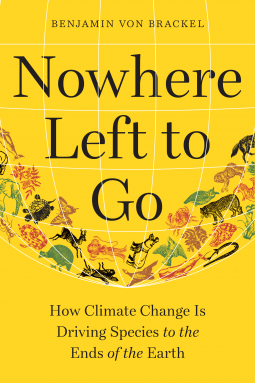
Nowhere Left to Go
How Climate Change Is Driving Species to the Ends of the Earth
by Benjamin von Brackel
This title was previously available on NetGalley and is now archived.
Send NetGalley books directly to your Kindle or Kindle app
1
To read on a Kindle or Kindle app, please add kindle@netgalley.com as an approved email address to receive files in your Amazon account. Click here for step-by-step instructions.
2
Also find your Kindle email address within your Amazon account, and enter it here.
Pub Date Jul 05 2022 | Archive Date Jul 19 2022
Talking about this book? Use #NowhereLefttoGo #NetGalley. More hashtag tips!
Description
This file is NOT currently available for Kindle. We apologize for any inconvenience. If you have difficulties with downloading, please email us (at publicity@theexperimentpublishing.com) for assistance or leave a note in lieu of a review rating.
Harrowing journeys of animals and plants—fleeing skyrocketing temperatures and mega-droughts—reported from the frontlines of the greatest migration of species since the Ice Age
As humans accelerate global warming while laying waste to the environment, animals and plants must flee to the margins: on scattered nature reserves, between major highways, or among urban sprawl. And when even these places become too hot and inhospitable, wildlife is left with only one path to survival: an often-formidable journey toward the poles as they race to find a new home in a warming world. Tropical zones lose their inhabitants, beavers settle in Alaska, and gigantic shoals of fish disappear—just to reappear along foreign coastlines.
Award-winning environmental journalist Benjamin von Brackel traces these awe-inspiring journeys and celebrates the remarkable resilience of species around the world. But the lengths these plants and animals must go to avoid extinction are as alarming as they are inspirational: Sea animals—like fish—move on average 45 miles a decade to cooler regions, while land animals—like beavers and butterflies—move 11 miles. As even the poles of the Earth heat up, we’re left with a stark and irreversible choice: Halt the climate emergency now, or face a massive die-off of species, who are increasingly left with nowhere else to go.
Available Editions
| EDITION | Other Format |
| ISBN | 9781615198610 |
| PRICE | $26.95 (USD) |
| PAGES | 288 |
Average rating from 4 members
Featured Reviews
I'm always trying to mix in more nonfiction amongst all the novels I read, and bonus points if I get to learn something interesting along the way. I revel in any new information related to the environment, and I can be moved to tears at the sight of an adorable animal. Nowhere Left to Go checked all these boxes.
This book describes the harrowing realities of animals and plants that have been impacted by increased temperatures and have no choice but to flee their habitat.
There's a lot of great scientific discussions with the data to back it up, and I liked that it wasn't too dense or overly casual. I was also surprised at the emotions this book stirred up in me. Reading so many unfortunate animal anecdotes that details their struggles to survive is upsetting but also motivating. I finished this book wanting to learn more and do more. Additionally, there are so many fascinating tidbits in this book (I PROMISE it's not a completely doom and gloom sort of tone).
I enjoy reading this book although I am not usually a reader of scientific topics. This one does catch my attentions, especially how other animals react to the "global warming" and related evidences. Frankly, there are slightly more discussions on science more than expected, but I highly recommend taking sometime for this informative book.
 Kathryn C, Reviewer
Kathryn C, Reviewer
In another life, I might have chosen one of the science paths, and thus enjoy the well written articles that explain some of the most technical written articles into language that anyone can understand.
In this case, Mr. von Bracket delivered a deeply insightful book while gathering resources from diverse fields within the world's biological research communities and created a comprehensive, clear to follow, reason for why biologists have been sounding the alarm around the world about climate change.
Traveling the world and pulling findings together that show the pattern so clearly from arctic to tropics, land to ocean, and even from all the other animals to our own beginning migrations to cooler climates, this book simply presents it in a compelling narrative that draws the reader into the consider what each of these studies that continue to show why nature is migrating the way it is.
The minute changes that each of us may see in our own yard, and our own weather, and can relate so clearly to one of those studies that is happening around the globe. A reason to consider whether to eat what is in season versus the shipping of fruits and vegetables out of season, a reason to consider whether to change the light switches to motion sensors to help with just one iota of the energy being used that could be generated by a fossil fuel.
This is one book that I would love for every policy creator to sit and read and understand why we may need to do something now; to suggest to big companies that have created dependency on some of what we as consumers do that shifting to also help replace, repair and help sustainability may be in the best interest and cost less in the long run.
Truly an amazing read, and I am grateful that I was able to read this as an advanced readers copy.
#nowherelefttogo #advancedreadercopy #netgalley #bookreview
Readers who liked this book also liked:
We Are Bookish
Business, Leadership, Finance, Nonfiction (Adult), Self-Help
We Are Bookish
General Fiction (Adult), Romance, Women's Fiction
We Are Bookish
Mystery & Thrillers, OwnVoices, Teens & YA
Benjamin Stevenson
General Fiction (Adult), Humor & Satire, Mystery & Thrillers














